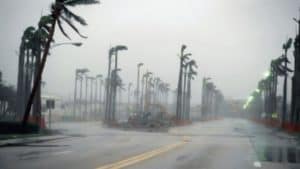Should I Buy An Investment Property In A Flood Zone?

The damage incurred by the first two hurricanes was apocalyptic. With over 80 deaths from Harvey, more than 60 deaths from Irma and hundreds of thousands of displaced families and businesses, the aftermath will remain significant for years to come. Certainly, our thoughts are with those who were affected by the hurricane.
The economic losses caused by the hurricanes are also shocking. Preliminary estimates for Harvey and Irma damages are in the hundreds of billions. And to make matters worse, a large portion of the economic damage is on properties without flood insurance.
Therefore, as real estate investors, we must take the possibility of flood damage into account when considering an investment. A property located in a flood zone by no means automatically disqualifies a potential investment. However, it will require additional upfront due diligence on your part so that if a hurricane or flooding occurs, you have your bases covered and your investment isn’t negatively affected.
Should I buy flood insurance?
For a property that is in an area designated a high risk for flooding and will be purchased with a mortgage, it is required by federal law to have flood insurance.
However, with Hurricane Harvey, neighborhoods not considered flood zones were impacted. Since flood insurance wasn’t required, many families will have to bear the tremendous financial burden themselves. According to FEMA, more than 20% of flood claims come from properties not located in high-risk flood zones. Therefore, if an investment property is on the border of a flood plane, you may still want to consider buying flood insurance.
For information on flood hazards and official flood maps, use the FEMA Flood Map Service Center. This tool allows you to enter an address or area to obtain the most up-to-date flood map. And when in doubt, contact a local insurance agent to determine if the property is at risk for flooding.
How much does flood insurance cost?
Compared to the economic burden placed on those without flood insurance, it’s relatively inexpensive. A study conducted by FEMA found that just one inch of interior flooding can result in nearly $27,000 in damage. The amount reaches over six figures if the flooding is a few feet or more.
Contrast that to the typical cost of flood insurance. According to Cincinnati Insurance board director Ron Eveligh, a flood policy with $250,000 in coverage will run you about $500 a year for a residential building. So, to determine if a property in a flood zone is a good investment, it is vital to account for the cost of flood insurance during the underwriting process.
If the addition of the monthly expense results in a financial return that’s outside your investment goals, you need to pass up on the deal or investigate ways to increase income or decrease expenses elsewhere. In other words, plan for flood insurance the same way you do for other expenses, like maintenance, property taxes, and vacancy.
How do I buy flood insurance?
Damage from flooding is not covered under your basic homeowners’ or renters’ insurance. It must be purchased separately, and you can only buy flood insurance through an insurance agent. If a property is in a high-risk flood zone, it will require flood insurance before a lender will close on the loan. So, the purchasing of flood insurance will need to be taken care of prior to close in that case.
If a property is not in a high-risk flood zone, but it’s either in a moderate to low-risk flood zone or just outside the border of a flood zone and you want a quote for how much insurance will cost, it’s a good idea to reach out to your local insurance agent for a quote. If your insurance agent doesn’t offer flood insurance, you can request an agent referral from the National Flood Insurance Program Referral Call Center by calling 1-800-427-4661.
In general, owning investment property requires proper planning. With underwriting, lender communications, inspections, etc., your list of duties fills up quickly. However, do not neglect to determine if the property is at risk of flooding.
Taking the time to figure out if a property needs flood insurance, how much it costs and the process of obtaining it upfront can save you tens of thousands of dollars and a huge headache should disaster strike.
Source: forbes.com















 Accessibility
Accessibility